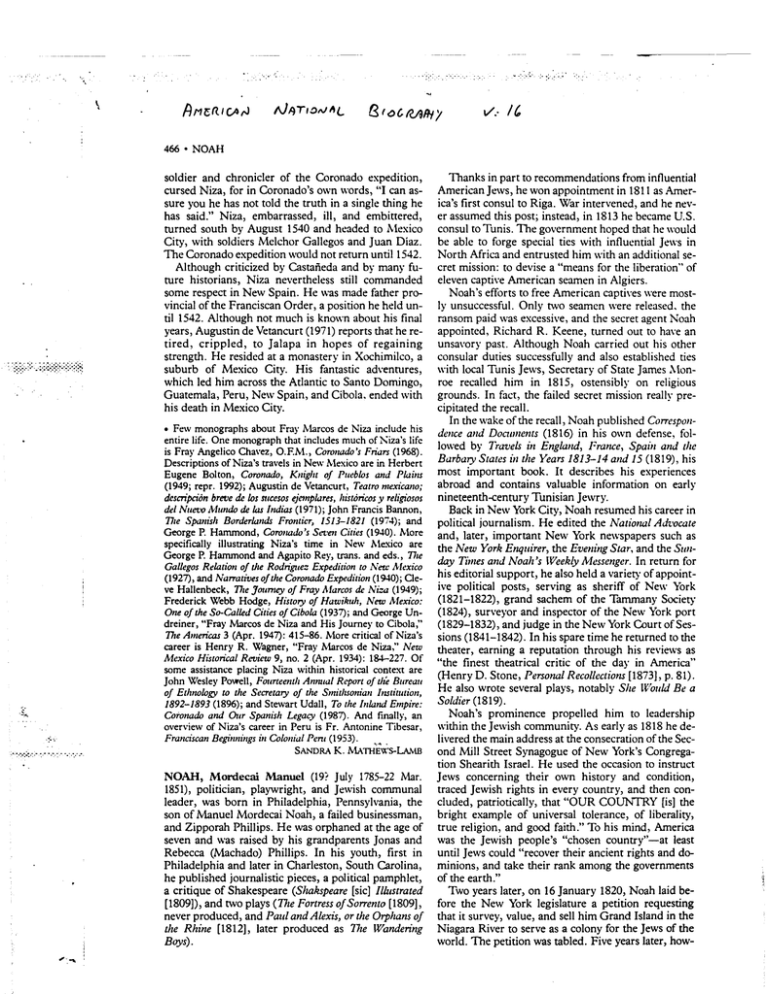.· \
advertisement

.· ,'_ \ v.· /C. 466 • NOAH soldier and chronicler of the Coronado expedition, cursed Niza, for in Coronado's own words, "I can assure you he has not told the truth in a single thing he has said." Niza, embarrassed, ill, and embittered, turned south by August 1540 and headed to Mexico City, with soldiers Melchor Gallegos and Juan Diaz. The Coronado expedition would not return untill542. Although criticized by Castaneda and by many future historians, Niza nevertheless still commanded some respect in New Spain. He was made father provincial of the Franciscan Order, a position he held until 1542. Although not much is known about his final years, Augustin de Vetancurt (1971) reports that heretired, crippled, to Jalapa in hopes of regaining strength. He resided at a monastery in Xochimilco, a suburb of Mexico City. His fantastic adventures, which led him across the Atlantic to Santo Domingo, Guatemala, Peru, New Spain, and Cibola, ended with his death in Mexico City. • Few monographs about Fray Marcos de Niza include his entire life. One monograph that includes much of};iza's life is Fray Angelico Chavez, O.F.M., Coronado's Friars (1968). Descriptions ofNiza's travels in New Mexico are in Herbert Eugene Bolton, Coronado, Knight of Pueblos and Plains (1949; repr. 1992); Augustin de Vetancurt, Teatro mexicano; descripcion breve de los mcesos ejemplares, llis!Oricos y religiosos del Nuec:o AJrmdo de las /ndias (1971); John Francis Bannon, 17re Spanish Borderlands Frontier, 1513-1821 (1974); and George P. Hammond, Coronado's Set•m Cities (1940). More specifically illustrating Niza's time in New Mexico are George P. Hammond and Agapito Rey, trans. and eds., 17re Gallegos Relation of tire Rodriguez Expedition to New Mexico (1927), and Narratives of the Coronado Expedition (1940); Cleve Hallenbeck, 17re Journey of Fray Marcos de Niza (1949); Frederick Webb Hodge, History of Hawikuh, New Mexico: One of the So-Called Cities of Cibola (1937); and George Un- dreiner, "Fray Marcos de Niza and His Journey to Cibola," The Americas 3 (Apr. 1947): 415-86. More critical of Niza's career is Henry R. Wagner, "Fray Marcos de Niza," New Mexico Histon'cal Review 9, no. 2 (Apr. !934): 184-227. Of some assistance placing Niza within historical context are John Wesley Powell, Fourteenth Ammal Report of tlie Bureau of Ethnology to the Secretary of the Smitlrsonian lrutitwion, 1892-1893 (1896); and Stewart Udall, To the Inland Empire: Coronado and Our Spanish Legacy (1987). And finally, an overview of Niza's career in Peru is Fr. Antonine Tibesar, Franciscan Beginnings in Colonial Pem (1953). SANDRA K. MATHE\-(·s-LAMB NOAH, Mordecai Manuel (19? July 1785-22 Mar. 1851), politician, playwright, and Jewish communal leader, was born in Philadelphia, Pennsylvania, the son of Manuel Mordecai Noah, a failed businessman, and Zipporah Phillips. He was orphaned at the age of seven and was raised by his grandparents Jonas and Rebecca (Machado) Phillips. In his youth, first in Philadelphia and later in Charleston, South Carolina, he published journalistic pieces, a political pamphlet, a critique of Shakespeare (Shakspeare [sic] Illustrated [1809)), and two plays (The Fortress of Sorrento [1809), never produced, and Paul and Alexis, or the Orphans of the Rhine (1812], later produced as The Wanden'ng Boys). Thanks in part to recommendations from influential American Jews, he won appointment in 1811 as America's first consul to Riga. War intervened, and he never assumed this post; instead, in 1813 he became U.S. consul to Tunis. The government hoped that he would be able to forge special ties with influential Jews in North Africa and entrusted him with an additional secret mission: to devise a "means for the liberation" of eleven captive American seamen in Algiers. Noah's efforts to free American captives were mostly unsuccessful. Only two seamen were released, the ransom paid was excessive, and the secret agent Noah appointed, Richard R. Keene, turned out to ha\·e an unsavory past. Although Noah carried out his other consular duties successfully and also established ties with local Tunis Jews, Secretary of State James ~ion­ roe recalled him in 1815, ostensibly on religious grounds. In fact, the failed secret mission really precipitated the recall. In the wake of the recall, Noah published Correspondence and Documents (1816) in his own defense, followed by Travels in England, France, Spain and the Barbary States in the Years 1813-14 and 15 (1819), his most important book. It describes his experiences abroad and contains valuable information on early nineteenth-century Tunisian Jewry. Back in New York City, Noah resumed his career in political journalism. He edited the National Ad~·ocate and, later, important New York newspapers such as the New York Enquirer, the Evening Star, and the Sunday Times and Noah's Week(y .1Hessenger. In return for his editorial support, he also held a variety of appointive political posts, serving as sheriff of New York (1821-1822), grand sachem of the Tammany Society (1824), surveyor and inspector of the New York port (1829-1832), and judge in the New York Court of Sessions (1841-1842). In his spare time he returned to the theater, earning a reputation through his reviews as "the finest theatrical critic of the day in America" (Henry D. Stone, Personal Recollections [1873], p. 81). He also wrote several plays, notably She Would Be a Soldier (1819). Noah's prominence propelled him to leadership within the Jewish community. As early as 1818 he delivered the main address at the consecration of the Second Mill Street Synagogue of New York's Congregation Shearith Israel. He used the occasion to instruct Jews concerning their own history and condition, traced Jewish rights in every country, and then concluded, patriotically, that "OUR COUNTRY [is] the bright example of universal tolerance, of liberality, true religion, and good faith." To his mind, America was the Jewish people's "chosen country"-at least until Jews could "recover their ancient rights and dominions, and take their rank among the governments of the earth." Two years later, on 16 January 1820, Noah laid before the New York legislature a petition requesting that it survey, value, and sell him Grand Island in the Niagara River to serve as a colony for the Jews of the world. The petition was tabled. Five years later, how- 1\:0AILLES • 467 ever, an investor acting on Noah's behalf purchased 2,555 choice acres on the eastern shore of the island, and on is September 1825 Noah staged an elaborate dedication ceremony for a colony to be called Ararat, a refuge for persecuted Jews around the world. Titling himself Judge of Israel and dressed in a regal costume, Noah issued a proclamation complete with a series of decrees. Among other things, he called on Jews to remain loyal to governments that protected them, to undertake a worldwide census, to abolish polygamy (practiced by Jews in Muslim lands), and to learn how to read and write. He also levied a threeshekel head tax "upon each Jew throughout the world." In a lengthy address, he then explained the details of his colonization plan, including its implications for America and for ultimate Jewish restoration to Palestine. Here, as in so many of his other pronouncements on Jewish affairs, he sought to prove that he could be a good citizen as well as a good Jew, helping his people and his country at the same time. Although Ararat attracted attention throughout much of the Jewish world, it proved a complete failure: it never progressed beyond the original cornerstone. Still, Noah remained active in Jewish affairs, playing a particularly effective role vis-a-vis the nonJewish community, where he was greatly respected. He explained Jewish practices in his newspapers, defended Jews whenever he saw them attacked, and promoted Jewish charities. He also delivered celebrated addresses on Jewish themes, including one, in 1837, arguing that the Indians were descendants of the lost ten tribes of Israel and another, in 1845, seeking Christian help in promoting restoration of the Jews to Palestine. Noah died in New York from the effects of a paralyzing stroke. His funeral, attended by Jews and nonJews alike, was probably the largest funeral of any Jew in America to that time. • Papers of Mordecai Noah are scanered. The best collection, including photocopies of leners found elsewhere, is in the American Jewish Archives, Cincinnati, Ohio. Other letters, including valuable family leners, are found at the American Jewish Historical Society on the campus of Brandeis University, Waltham, Mass. Jacob Blanck, Bibliography of Atnerican Literall/re, vol. 6 (1973), offers the most complete bibliography of Noah's writings. For corrections and. additions, as well as a complete list of secondary sources, see the bibliographical essay found in the biography by Jonathan D. Sarna, Jacksonian Jew: T11c Two Worlds of lHordecai Noah (1981). An earlier biographical study is Isaac Goldberg, Major Noah: Amen·can Jewish Pioneer (1938). JONATIIAN D. SARNA NOAILLES, Louis Marie (17 Apr. 1756-7 Jan. 1804), soldier, known by his title, the vicomte de Noailles, was born in Paris, France, the son of Philippe, a marshal and due de Mouchy, and Anne d'Arpajon. At age twelve he was inducted into the king's personal guard. At fifteen he was breveted sous-aide major of the Noailles regiment and two years later assumed the rank of captain. In 1773 he married his cousin Louise de No- ailles, sister of the future wife of the marquis de Lafayette; the couple had three children who survived infancy. Noailles carried the title chevalier d'Arpajon until 1775. At nineteen he became a serious student of military science and academics. Noailles desired to go to America with Lafayette and wrote to Jean-Fn!deric Phelypeaux, the comte de .Maurepas and Louis XVI's chief minister, to that effect, but his family discouraged him from pursuing the idea. He served in the French army as aide to the quartermaster and supernumerary in Brittany and Normandy in June 1778. He was promoted to the rank of metre de camp en second in the regiment of the colonel general ofHussards in 1779. He sen·ed in the West Indies campaign, distinguishing himself at the siege of Grenada on 4 July 1779. D'Estaing wrote to his father, "The vicomte has acted like a lieutenant general. ... I cherish him and esteem him." At the siege of Savannah with d'Estaing, Noailles covered the French rear guard in its withdrawal in October. D'Estaing this time predicted, "He will do the greatest things." On 20 January 1780 he was awarded the che\·alier de SaintLouis and on 8 March 1780 was named metre de camp en second of the Soissonnais regiment. Noailles returned to America with Rochambeau's army in July 1780. With the French army inactive at Newport, Rhode Island, Noailles offered his services to the Americans but withdrew the request when Lafayette predicted that Rochambeau would not assent. After distinguishing himself notably at the siege of Yorktown in October 1781, he was the French army representative at the surrender of Charles, Lord Cornwallis. He returned to France with Lafayette and was promoted to metre de camp and commandant of the regiment of the King's Dragoons on 27 January 1782, then he transferred to the regiment ofChasseurs of Alsace in March 1788. Noailles returned to France from the American Revolution filled with its liberal ideas. He served in the Assembly of Notables in 1787, and on 16 March 1789 he became a deputy to the Estates General for the nobility of the bailliage of Nemours. On 13 June he proposed to the majority of his order that they join the commoners of the Third Estate, and along with Lafayette, he went on 25 June to join others in forming the National Assembly. On the night of 4 August Noailles proposed the abolition of the privileges of nobility before the National Assembly, and on 19 June 1790 he proposed the abolition of noble titles. On 26 February 1791 he was elected president of the Constituent Assembly. He became marechal de camp in the Army of the North on 28 November 1791 but resigned his commission in .tV1ay 1792 to protest the lack of military discipline. Though he was obliged to flee from France to England in the summer of 1792 as the revolution radicalized, his wife remained in France and was guillotined on 22 July 1794. Noailles sailed to the United States in April 1793. Settling in Philadelphia, he prospered in business ventures with William Bingham, Robert Morris (17341806), and John Nicholson. Among their projects was




